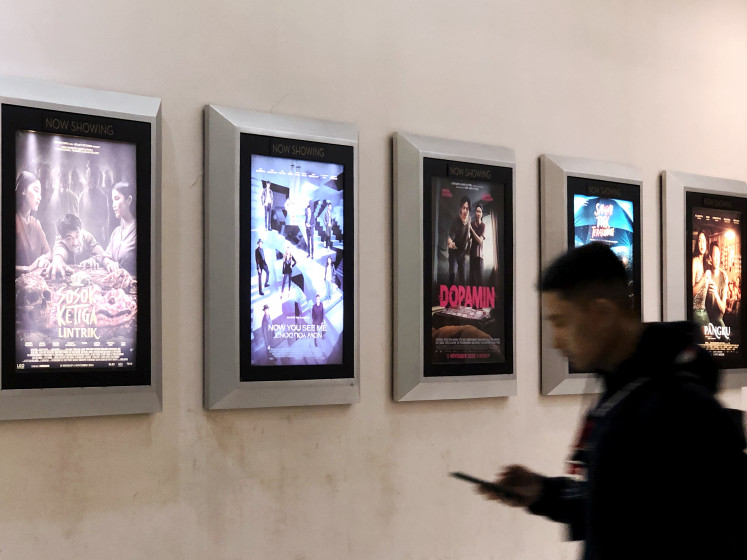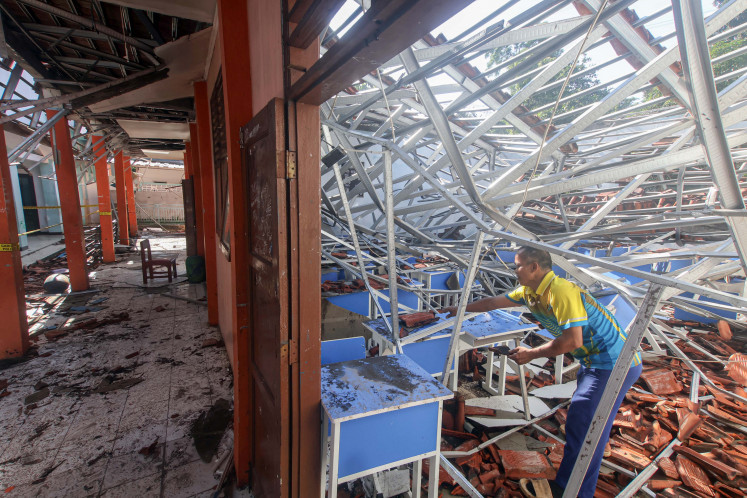Popular Reads
Top Results
Can't find what you're looking for?
View all search resultsPopular Reads
Top Results
Can't find what you're looking for?
View all search resultsSocial media helps libraries promote literacy
Literacy activists and schoolteachers in remote areas of East Nusa Tenggara (NTT) are making use of social media to enrich their respective book collections in a bid to improve reading habits among the younger generations in the province
Change text size
Gift Premium Articles
to Anyone
L
iteracy activists and schoolteachers in remote areas of East Nusa Tenggara (NTT) are making use of social media to enrich their respective book collections in a bid to improve reading habits among the younger generations in the province.
Using smartphones and social media platforms such as Facebook, Instagram, Twitter, YouTube and others, they have uploaded and published literacy activities in various remote areas, and getting in touch with literacy activists nationally and even globally to donate new books for them.
The activities have also encouraged young people studying in other regions across Indonesia or even abroad to motivate activists and teachers in the province to establish libraries and literacy movements in villages in their respective remote regions.
In Flores, literacy activists move from one village to another and from one educational institution in remote regions to another, to promote the activities. Catholic priests and local youths have also joined hands to establish reading centers.
Local priest Wilfridus Babun, founder of West Flores Kompak Le Nuk, said the institution had established as many as 30 literacy groups across Flores and the Sumba Island hinterland.
He cited the success of the program thanks to a program initiated by state-owned postal company PT Pos Indonesia that helped his institution distribute books to the reading centers across Sumba Island and in several regencies in Flores Island. However, the program has since been halted.
"The end of the program influenced all the literacy knots that Kompak Le Nuk established in Manggarai, Ngadha and Sumba,” Babun told The Jakarta Post last week.
He added that Kompak Le Nuk library had some 2,000 books in various categories including education, agriculture and horticulture. The library is located in remote Dadar hamlet in West Manggarai. Yet, so far, no book had been donated to the library by the regency administration.
For new book collections, Babun said, the library counted on donors and established relationships.
It has also held discussions with local literacy communities in a bid to find solutions.
The library manager, Tamsi Babut, said his private residence served as a temporary place to run the library as it did not have its own building yet.
Founder of Cengka Ciko reading house in Rondo Woing village, Ranamese, East Manggarai, Romanus Rudianto Pantur, said the most challenging part in running the library was to provide facilities, as well as book collections to promote literacy among residents.
He explained that the library so far counted on donors for the operation and the library collection. “I try to build relationships with friends from across Indonesia who I know also have the same concerns,” Romanus said.
Muhammad Buharto, founder of Lalong Beo reading house that was established in 2016 in Naga hamlet, Matawae village, West Manggarai, said the library also counted on donors and friends to operate and enrich collections.
“Thanks to social media posts, many friends know of our activities and send us books,” said Buharto, adding that the movement had very much appreciated the free book-delivery program through the post office.
The library also relied on donations for a temporary reading room, as well as bookshelves, chairs, boards and solar cell for illumination.
Buharto and other literacy activists in the region acknowledge the role of social media in helping inform the world about their positive activities of enlightening young people through reading and writing activities.
“We make use of the sophisticated technology to educate the country’s younger generation and to campaign for other positive activities,” Buharto said adding that the activities were expected to also improve national development.
NTT is categorized as a disadvantaged, remote and backward region with a human development index of 64.30 last year. Many of its regions are difficult to reach because of limited land transportation facilities and poor road infrastructure.










